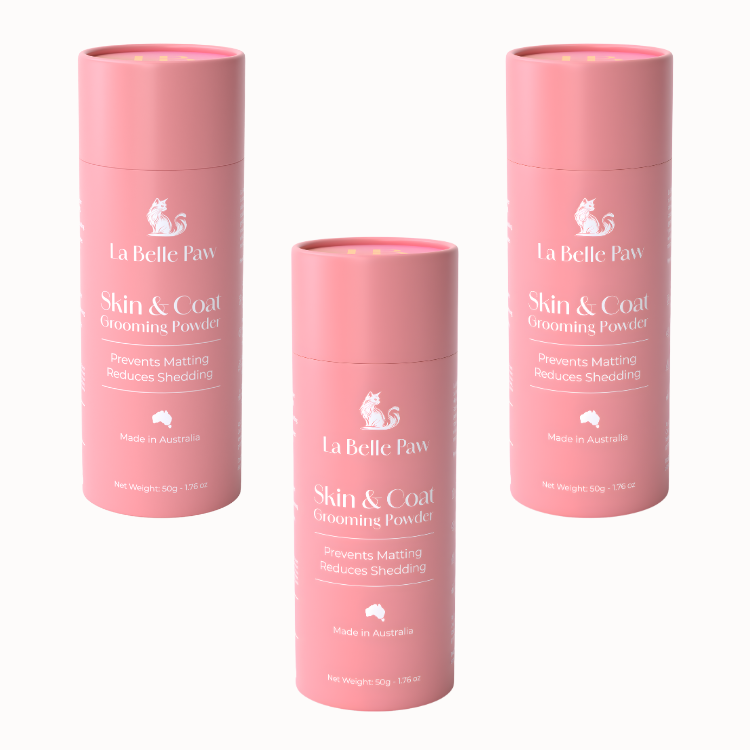
Why Does My Cat Hate to Be Brushed? And What Can I Do About It?
Share
Why Does My Cat Hate to Be Brushed?
Let’s be honest—brushing your cat should be a bonding moment. But for many cat owners, it turns into a scratchy, growly, tail-thumping nightmare. If you're searching for answers to “why does my cat hate to be brushed?” — you’re not alone.
The truth is, some cats absolutely despise being groomed. The good news? There are ways to make grooming easier (even enjoyable), and tools like our Skin & Coat Grooming Powder that can help you maintain a healthy, clean coat without the stress.
5 Potential Reasons
It’s not personal. Your cat isn't mad at you—they're just reacting to a combination of instinct, past experience, and physical sensitivity.
1. Sensory Overload
Cats are extremely sensitive. Their skin is packed with nerve endings. For some, brushing feels overwhelming or even painful, especially with the wrong brush.
2. Bad Associations
Was your cat roughly brushed at the vet? Or during a mat removal session? Negative memories can make them dread grooming forever.
3. Matted or Dirty Fur
If your cat already has mats or tangles, brushing can tug the skin. That hurts—and makes them fight harder the next time.
4. Touch Sensitivity
Some cats simply don’t like being touched in certain areas—especially the belly, tail base, or hind legs.
5. Fear or Anxiety
New sounds, unfamiliar brushes, or sudden movements during grooming can trigger anxiety in nervous cats.
Should You Stop Brushing Altogether?
Absolutely not. Just because your cat hates brushing doesn’t mean you should give up. Skipping grooming can lead to:
-
Painful matting
-
Excessive shedding
-
Hairballs
-
Skin irritation
-
Missed signs of health problems
How to Help a Cat That Hates Being Brushed
Let’s turn battle time into bonding time. Here's how.
1. Choose the Right Brush
Soft bristle brushes, grooming gloves, or silicone brushes are gentle and less intimidating.
2. Start Small and Reward
Begin with 10-second sessions. Focus on areas your cat enjoys being touched (like the cheeks or shoulders). Use treats after every session.
3. Create a Calm Routine
Brush after meals, or when your cat is already relaxed. Play soft music, speak gently, and never force.
4. Try Skin & Coat Grooming Powder
Don’t want to deal with a brush every time? Our Skin & Coat Grooming Powder is a stress-free alternative that helps:
-
Loosen dead hair
-
Absorb oil and odors
-
Soften tangles for easier brushing
-
Leave fur smooth, clean, and fresh—without water
Just sprinkle, rub gently, and brush lightly if tolerated.
5. Know When to Stop
If your cat starts hissing, hiding, or lashing out—stop. Take a break and try again later. Positive association is key.
How Often Should You Groom a Brush-Hating Cat?
It depends on the breed and coat type. Here’s a general guide:
-
Short-haired cats: 1–2 times per week
-
Long-haired cats: Daily, even if just a few minutes
-
Skin & Coat Powder: Once or twice a week to refresh coat without water
The Power of Positive Reinforcement
Turn grooming into a game. Use:
-
Tasty lickable treats
-
Catnip before and after
-
Clicker training (yes, it works!)
-
Praise and cuddles
Over time, many cats go from brushing haters to brushing lovers. Or at least... tolerators.
Other Tips to Make Grooming Easier
-
Use elevated surfaces like a table (cats feel more secure)
-
Keep sessions short—less is more at first
-
Avoid brushing when your cat is playful or anxious
-
Involve scent—rub the brush with a towel your cat loves
-
Trim nails first to prevent scratches if things go south
When to Involve a Professional
If your cat has:
-
Severe mats
-
Aggressive behavior
-
Skin infections
-
Undercoat buildup
…it’s time to call a professional cat groomer or speak with your vet. Groomers know how to handle even the most brush-averse felines with calm, skill, and cat whisperer energy.
Why Skin & Coat Grooming Powder Is a Game-Changer
We get it—brushing a resistant cat is tough. That’s why we created the Skin & Coat Grooming Powder. It’s:
-
Safe and lick-friendly
-
Talc-free and fragrance-free
-
Soothing for sensitive skin
-
Perfect for in-between brushing and bath sessions
It’s loved by groomers, trusted by vets, and made for cats who say NOPE to grooming.
Conclusion
If your cat hates to be brushed, don’t worry—you’re not a bad cat parent. You're just dealing with a furry little personality full of preferences and quirks.
By understanding their triggers, starting slow, and incorporating gentle alternatives like Skin & Coat Grooming Powder, you can maintain a clean, healthy coat and a happy relationship.
And if mats or stress get too intense—don’t hesitate to visit a professional groomer. Your cat deserves it.
FAQs
1. Why does my cat cry or growl when I brush them?
It could be due to pain, fear, or sensitivity. Try a softer brush or grooming powder, and consult a vet if it continues.
2. Is it okay to skip brushing altogether?
Not recommended. Regular grooming prevents mats, hairballs, and skin issues. Try alternatives if brushing is a struggle.
3. How does Skin & Coat Powder help cats that hate brushing?
It loosens dead hair, absorbs grease, and softens the coat without pulling—making brushing (or skipping brushing) much easier.
4. Can I use human dry shampoo instead?
No. Many contain harmful ingredients like alcohol, talc, or artificial fragrance. Always choose a product made for cats.
5. Should I sedate my cat to groom them?
Only under professional veterinary guidance. Try behavior training and gentle grooming first before considering medication.









